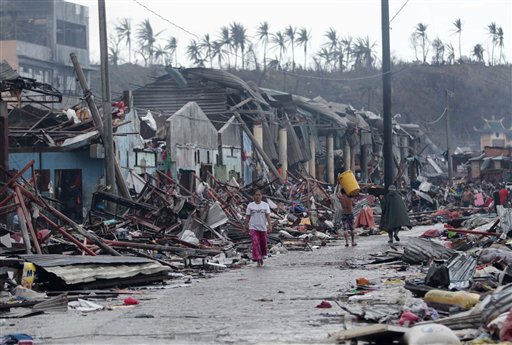DOH orders price freeze on 200 drugs to ensure supply for ‘Yolanda’ victims

Residents walk past damaged structures caused by typhoon Haiyan, in Tacloban city, Leyte province central Philippines. AP FILE PHOTO
MANILA, Philippines—The Department of Health (DOH) announced, on Thursday, the implementation of a price freeze on about 200 essential medicines to ensure their availability to thousands of “supertyphoon Yolanda” (international name Haiyan) victims.
The DOH is monitoring potential occurrence of outbreaks of communicable diseases because of the harsh conditions in the typhoon-stricken areas, including the lack of clean water and food and the breakdown in sanitation facilities.
Primary health facilities in the affected areas were also rendered non-functional in delivering medical aid for victims.
“Securing the health and safety of the typhoon victims is an immediate priority of the DOH. We have to make sure that they have access to the medicines that they need and that public hospitals and government agencies are able to source affordable drugs to reach as many of our countrymen severely affected by this crisis,” said Health Secretary Enrique Ona in a statement.
He directed all DOH regional directors to monitor the prices of essential drugs and ensure that there is no overpricing especially in calamity-stricken areas.
Article continues after this advertisementOna ordered the price freeze to be effective immediately in all public and private drug retail outlets nationwide, including hospital pharmacies.
Article continues after this advertisementA price freeze would mean that suppliers, pharmacies and hospitals should not unduly hike the prices of essential drugs from their prevailing prices before the occurrence of the calamity, he explained.
The price freeze on essential drugs should cover likely prevalent conditions among typhoon victims, including physical and mental trauma and injury, diarrhea, pneumonia, skin diseases and other infections such as leptospirosis and other endemic diseases in affected areas.
Other essential drugs covered by the price freeze include those that address common chronic diseases such as diabetes, hypertension and asthma likely to be aggravated by the anxiety and stress as well as the difficult conditions faced on a daily basis by the victims.
The Price Act (Republic Act 7581) mandates the DOH to automatically freeze the prices of essential drugs classified as basic commodities or impose maximum price ceilings particularly in times of calamities to protect consumers from profiteering, hoarding, cartels and other such violations by traders who may take advantage of the calamity situation.
Ona encouraged the public to report any violation, as he warned drug manufacturers, traders and retailers to strictly implement the order.
The DOH, through the Order, has published both the Drug Price Reference Index (DPRI) to impose a price ceiling in government bidding and procurement of medicines as well as Suggested Retail Prices (SRP) to guide consumers on the lowest cost quality generic drugs in private pharmacies.
RELATED STORIES:
Roxas: ‘Yolanda’ relief efforts clear but need is as huge as a ‘swimming pool’
More than half of 2,357 deaths come from Leyte, Samar – NDRRMC